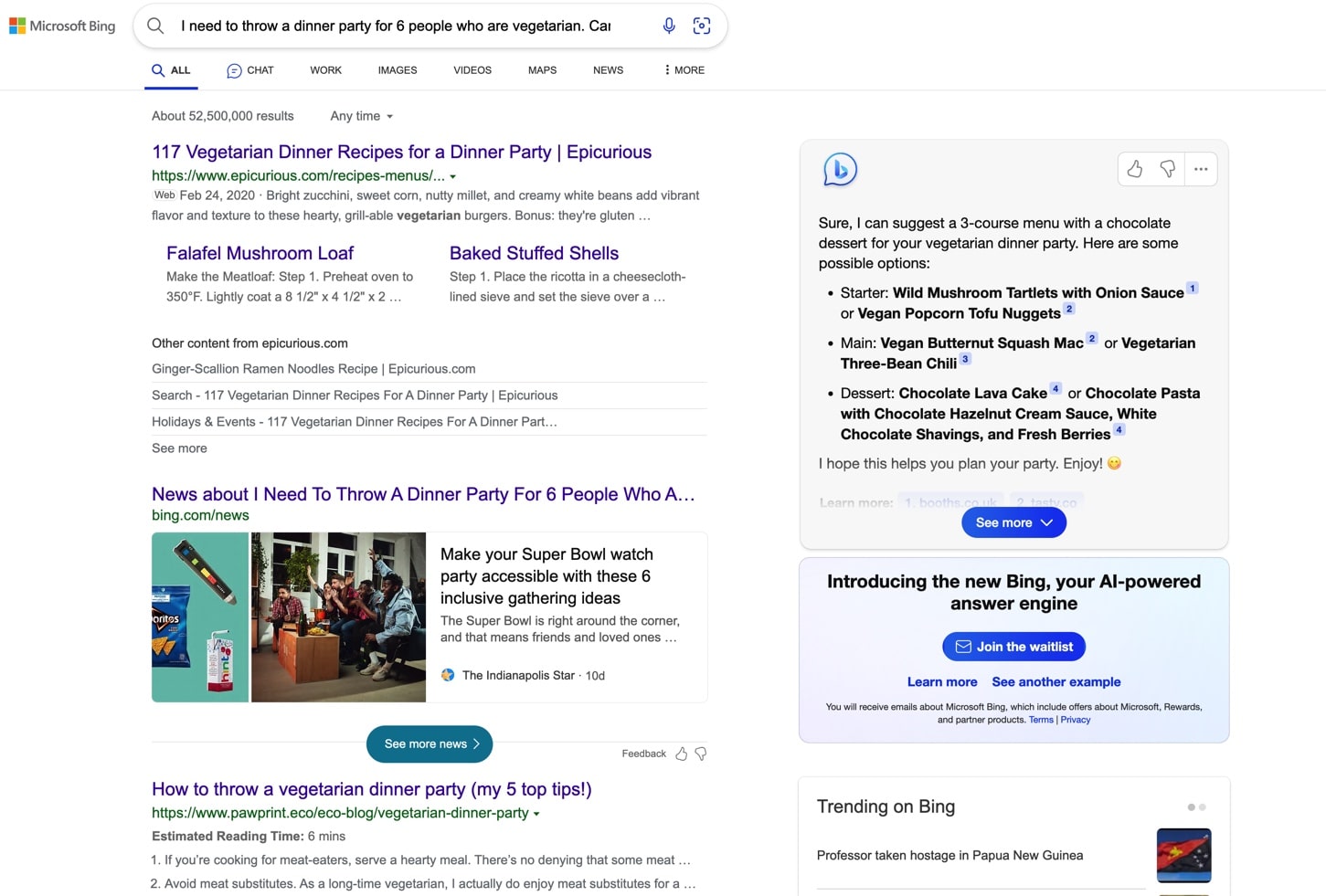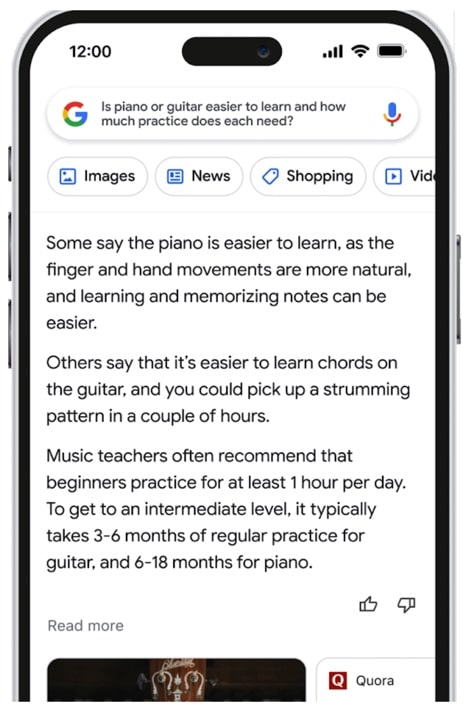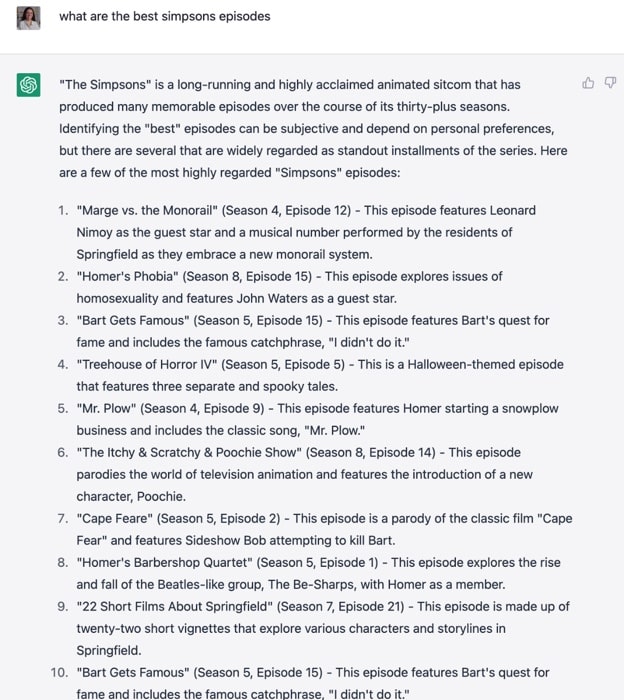It’s an exciting time in the world of SEO and digital marketing. If you haven’t heard, a new artificial intelligence (AI) tool called ChatGPT, has taken the world by storm since its release last November. It’s an online chat tool that can have full human-like conversations. What’s most impressive is that it can generate long-form content, keyword research, and even pass an Ivy-League MBA exam. What does this mean for SEO strategy?
Bing and Google Embrace AI
Two of the top search engines, Bing and Google, have taken notice and plan on incorporating their own AI-chat functions directly into their homepages.
Bing Incorporates ChatGPT
Bing, owned by Microsoft, officially unveiled their plans in the beginning of February on how they will restructure their homepage to include a ChatGPT function. It’s fairly impressive and you can get a preview of what it will look like here.

There are a few features that make this rollout promising. Most notably, it incorporates the ChatGPT tool seamlessly with traditional search results, leaving searchers a choice of what they would like to use. In addition, it rightfully sources information and links to external websites. Not only does this urge us to keep researching a topic to ensure accuracy, but it’s also beneficial for content creators.
Google Introduces Bard
The very next day, Google announced it will start incorporating its own AI-model they decided to call “Bard”. So far, we do not have an extensive preview like Bing, but they did reveal this image:

As an SEO, this is extremely concerning. As you can see, there are no source links or side-by-side implementation. You ask Google a question, it answers it. Why keep clicking any further?
It remains to be confirmed if the official rollout will look any different than this. Considering this announcement was rushed and included some glaring errors, the market took notice. As a result, I have a strong feeling this is not the end of updates from Google, and we’ll keep learning about new iterations in the very near future.
Is this the end of SEO?
Full disclosure, as an SEO Specialist, I may be a bit biased with my answer here. However, I can objectively say that no, SEO is not dead nor will it die anytime soon. As long as your brand is out there waiting to be found by online users, there will be a need for search engine optimization.
What will change is where your future customers are searching and where you will want to be found. For almost 20 years, the majority of Americans have used “Google” as a verb. It is by far the top choice of search engines and has far exceeded other competitors such as Bing and Yahoo.
However, in just the last week, we have seen how the advancement of AI technology has thrown a major wrench in Google’s game. It’s more out in the open and obvious now, but it should be noted that Google has struggled in recent months to keep up with new competition in the market, with more users turning to other search options such as TikTok.
Does this mean we completely ditch Google SEO strategy? No, definitely not anytime soon. If and when Google is phased out as the top choice, it will be a long-term effect. You and I may be up to speed with today’s technological advancements, but today’s average consumer is still going to stick to what they know and use the default option. Here at LimeLight, we are sticking to optimizing for Google as the primary search engine, but keeping a steady pulse on new and emerging search trends.
Is this the end of Content?
Short answer, no.
Long answer, content will continue to evolve as it always has done for years, decades, and centuries before now. Humans are always looking for new ways to communicate, whether that’s through traditional newspapers or digital online video. There will always be a need for content, but the deliverables will change.
In the early 2000s, sites like Xanga and LiveJournal became widely popular where internet users wrote personable, first-person blogs detailing whatever was on their mind. Since then, blogs have transformed into a widely-used marketing tool to help increase organic and social traffic.
I think somewhere along the way, we lost the mark. Why were blogs so popular in the first place? As humans, we seek authenticity. It was refreshing to get someone else’s opinions and thoughts in a non-formal way.
Today, two of the most popular social networking sites are Reddit and TikTok. These sites provide an alternative to Google, where you can get answers from a real human. Is the information always accurate? No, but that doesn’t matter. Between a human’s opinion and machine’s opinion, we are more willing to place trust in the human.
Lots of people already add ‘reddit’ to searches to get opinions.
That alone is testament to humans wanting human answers.
You think searchers will be happy with an AI only result?
The SERP isn’t going away.
— Joe Davies (@fatjoedavies) February 7, 2023
With this in mind, your brand has a chance to stand out among competitors who are most likely going all in with AI-technology. How do you do this? By going above and beyond with your content strategies and creating more than just a simple blog post. Add different forms of media that can’t simply be outputted by an online tool. Examples of this can include:
- Videos
- Infographics
- Webinars
- Podcasts
- Interactive quizzes
Organic content is often the first impression customers will have of your brand. Use this as an opportunity to make a lasting impression and encourage readers to subscribe to your newsletter and follow you on social media. Give them a reason to keep coming back for more content and look to you as a thought leader.
Should You Use ChatGPT to Write Your Content?
Where ChatGPT is most impressive is its ability to write both short and long-form content on any topic you ask in a matter of seconds. It’s a super useful tool to help drive down copywriting hours and costs significantly. However, there are few points to keep in mind before you go all in with ChatGPT:
Not Up-to-Date
As of right now, ChatGPT knowledge base is still a work in progress and can only process information up until 2021. If you want to publish blog posts with newsworthy statistics and quotes, you’ll still need to write this manually.
Costs and Wait Time
ChatGPT is free…for now. Currently, It’s offering a $20/month subscription to gain access to its full services, including bypassing wait times. That’s right…wait times. Its current server cannot handle the amount of traffic it is getting daily. If you want to save time by writing more blog posts, it’s somewhat counterproductive to rely on a tool you can only use at certain times in a given week.
Duplicate Content
If you are using ChatGPT to write about topics related to your industry, the chances that your competitors are using the very same prompts are high. If a potential buyer reads your blog that is almost identical to your competitors’ site, it’s not a good look and it’s a missed opportunity to differentiate your brand among the noise.
Human-in-the-Loop
In manufacturing, there’s a term they used called, “human-in-the-loop”. Warehouses have been using machine-learning robots of their own to help automate day-to-day processes. However, these robots still need human input in order to execute properly.
I bring this up because I am seeing the same pattern with ChatGPT. It writes fairly well-written blog posts, but it still needs human oversight before publication. The content itself reads like it was written by….well…a robot. If you want to use this content to bring in new customers, you’ll want to make sure your brand voice and tone is present throughout the post.
Not to mention, the output is not 100% reliable. Here’s an example:

I asked ChatGPT “What are the best Simpsons episodes?”.
Notice the error?
No, it’s not the omission of “Homer’s Enemy”. It listed “Bart Gets Famous” twice!
This is where the “human-in-the-loop” strategy comes into play. This is a nice outline. I can now take this and edit it where necessary, add a new number 10, and flesh it out with brand voice and some solid call-to-actions.
What Does the Future of SEO Look Like?
What we’re experiencing now is a pivotal shift in the internet space. This shift started in 2020 with the global pandemic and more people started using the internet to seek human connection. Social apps like Twitch and TikTok come to mind as content sources that grew exponentially in the last 2 years. More and more users are shifting away from popular social media apps of choice, such as Facebook and Twitter, when 10 years ago they were untouchable.
What I’m saying is, Google is not immune to the internet trends of our time. But just because users may or may not use Google anymore, doesn’t mean they will stop craving content. And that it won’t be even more difficult to make sure your website gets found. Someway, somehow, that’s where SEO will continue to thrive.



